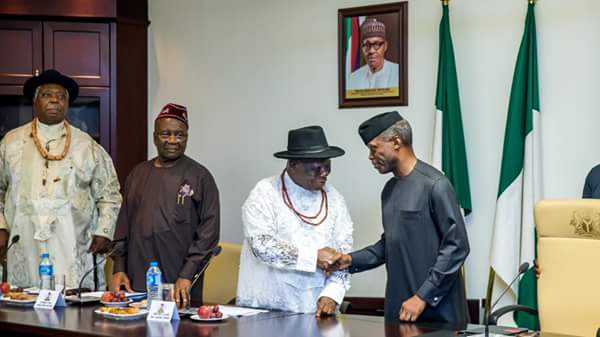Acting President, Yemi Osinbajo yesterday had a closed door meeting with stake holders of the Niger Delta. The meeting came after a November 1 ultimatum issued by the Pan Niger Delta Forum (PANDEF) to withdraw from peace talks unless the Federal Government met its 16 point demands made to President Muhamamd Buhari in November 2016.
During the meeting, the acting president highlighted the ways the government had moved to settle the demands of the Niger Delta region. He listed seven steps taken by the administration to entrench socioeconomic success for the Niger Delta people.
The seven major successes are underlisted:
- The federal government, FG, has started the process of replacing illegal refineries in the region with modular ones, including options on how to involve the communities as shareholders in the proposed modular refineries. Ground-breaking of the first set of such refineries are expected in the fourth quarter of this year.
In its operations, FG will supply crude to the local refineries at reasonably considered price, as an incentive to stop the current practice whereby illegal refiners vandalise and steal the crude. Each Niger Delta state is expected to host two modular refineries. -
Similarly, FG has commenced the process for the opening of the Maritime University at Okerenkoko in Gbaramatu Kingdom, Delta state. Already, a five-member inter-agency committee headed by the Minister of Education is in the final stages for the official opening of the university in the 2017/2018 academic session.
-
FG has released additional N35 billion to step up the Amnesty Programme in the Delta region, which is a specific and significant raise to the 2016 Budgetary allocation to the office.
This significant increase is already reflected in the 2017 budget with N70 billion allocation.
The Amnesty Office has since paid up all ex-militants backlog of their stipends up to April 2017. School fees for ex-militants studying abroad have been paid up to 80 per cent this July and the school fees in Nigeria paid up to 90 per cent this July.
Under the President Muhammadu Buhari administration, the Presidential Amnesty Programme has deployed 1294 beneficiaries in different programmes in different universities across the world. 1230 have graduated; 196 are maritime engineers, 59 pilots, and 120 automobile engineers.
It has established partnership with the PRESCOM (Presidential Committee on Small Arms and Light Weapons), UNDP, EU and UNREC to curb the proliferation of small arms and light weapons in the hands of unauthorized persons and groups.
-
To enhance a speedy development and restore peace in the Delta region, FG has revamped the Niger Delta Development Commission to drive the creation of development and infrastructure projects in the region.
-
An initial fund of $1 billion has been set aside for the clean-up and environmental remediation of Ogoniland.
A sum of $200 million will be disbursed yearly for the first five years and work on the project will be conducted in line with international best practices. Already soil and water tests have been done in preparation for the clean-up and 15 technical assistants hired to be part of the work from Ogoniland. -
To drive infrastructure, the FG has released funds for the continuation of various sections of the East-West Road. As at March, the overall project completion is substantial ( Section I – 99.98 per cent, Section II – I – 78.33 per cent, Section II -II – 67.95 per cent, Section III – 99.22 per cent, Section IV – 97.7 per cent) with Sections I and III completed and due for commissioning. The FG plans to construct health centres in the states and communities of the region. On completion, they will be fully equipped to address some of the health needs of rural dwellers.
This project will place the region as one of the most advanced places in Africa for high speed internet access and reliable communication systems. -
To further encourage infrastructure development, FG, through the Petroleum Ministry is also exploring with the international oil companies operating in the Niger Delta region on how to relocate their operational headquarters to their states of operations as different from administrative headquarters which often has only about five per cent of the staff.



Leave a Reply